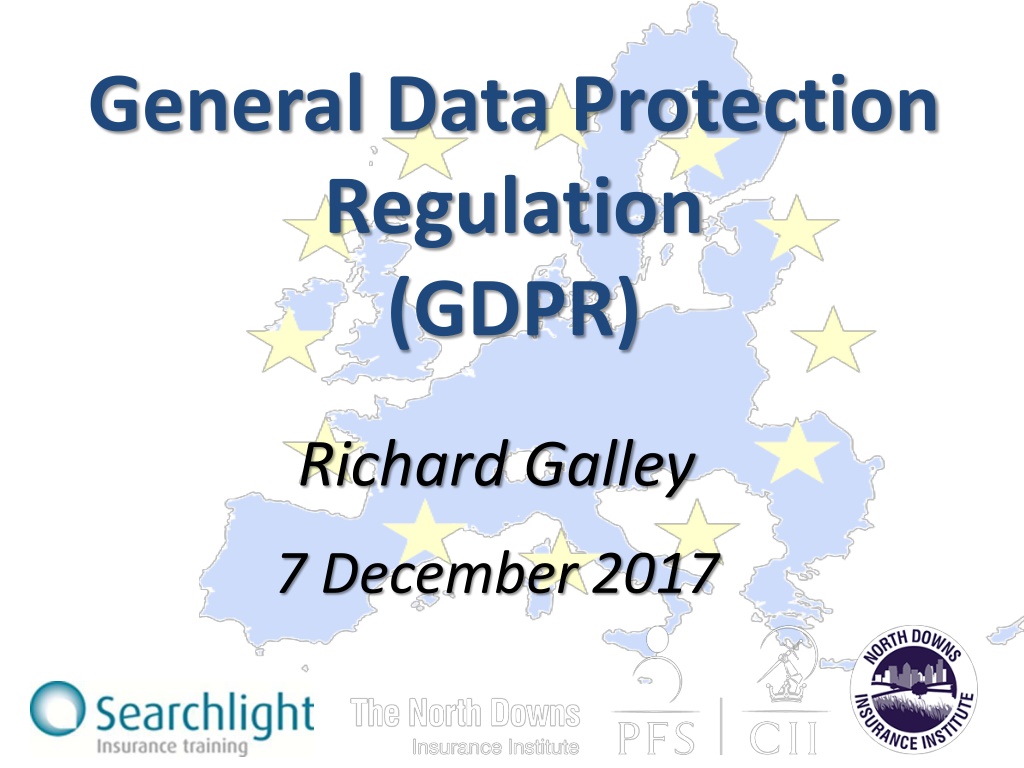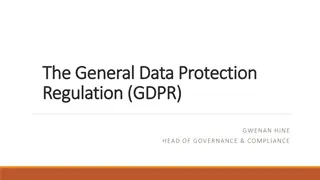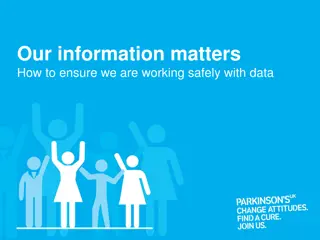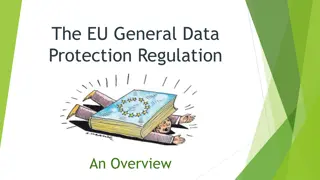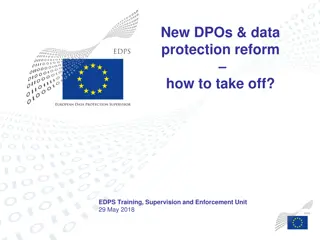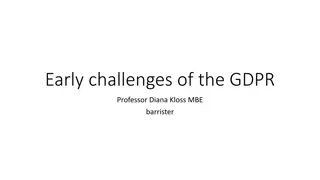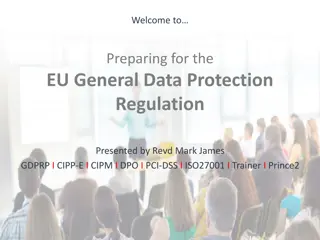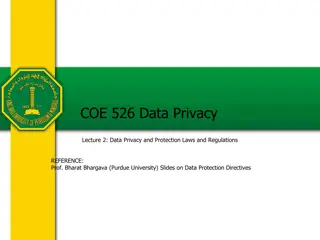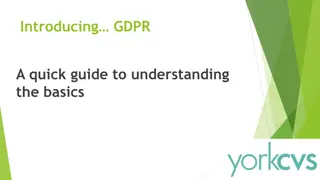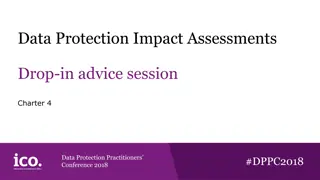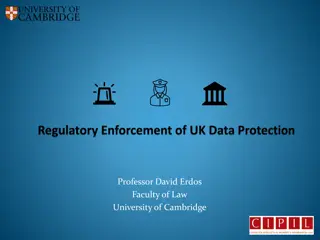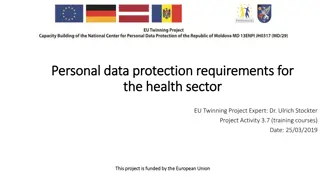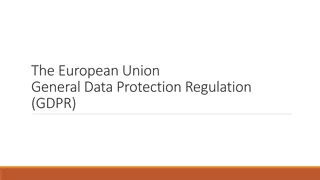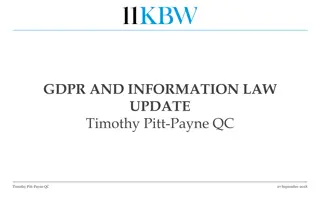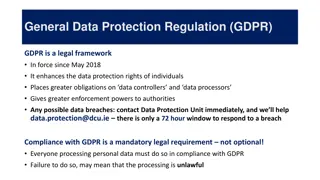Understanding the EU General Data Protection Regulation (GDPR)
This session focuses on the key elements of the GDPR, preparing for the UK's Data Protection Act implementation, the scope of GDPR, principles, individual rights, accountability, breaches, and top tips for action planning. GDPR is a crucial part of global data protection, especially for UK organizations. The regulation unifies data regulations in the EU, grants individuals greater control over personal information, and safeguards their data rights and interests.
Download Presentation

Please find below an Image/Link to download the presentation.
The content on the website is provided AS IS for your information and personal use only. It may not be sold, licensed, or shared on other websites without obtaining consent from the author. Download presentation by click this link. If you encounter any issues during the download, it is possible that the publisher has removed the file from their server.
E N D
Presentation Transcript
General Data Protection Regulation (GDPR) Richard Galley 7 December 2017
Todays session The purpose of this session is to help you understand the key elements of the EU General Data Protection Regulation (GDPR) and how you will need to prepare for implementation of the UK s new Data Protection Act.
Agenda Setting the scene DPA versus GDPR GDPR s scope The 6 Principles Consent and other lawful bases Individuals rights Accountability & governance Breaches The UK Data Protection Bill Top Tips & Action Planning
GDPR GDPR in force from 25 May 2018 Makes existing DP Directive (& UK Data Protection Act) redundant Brexit??! UK s decision to leave the EU will not affect GDPR s implementation
GDPR one way or another, GDPR is going to be an important part of the global data protection landscape over the years ahead, with great relevance to UK organisations, the public and their data. Rob Luke Deputy Commissioner, ICO May 2017
GDPR = Data Protection Bill 2017 A new law will ensure that the United Kingdom retains its world-class regime protecting personal data The Queen s Speech 21 June 2017
Any legislation introduced into Parliament is open to change so once we have a clearer idea of its final form we will be able to make firmer plans and develop the structure and the content of the guidance. Our aim is to provide a suite of data protection guidance that is as comprehensive as possible by May 2018. UK Information Commissioner
GDPR Why?! Unifies data regulations within the EU - creates a single regulatory framework across EU for DP Gives you and me greater control over our personal information Protects the rights and interests of the individual quantity and use of data
GDPR highlights Principles based! Applies to controllers and processors controller says how and why personal data is processed processor acts on the controller s behalf Applies to processing carried out by organisations operating in EU and to organisations outside EU that offer goods or services to EU citizens
GDPR highlights Places specific legal obligations on processors (e.g. keep records of personal data and processing activities) Significantly more legal liability if responsible for a breach
GDPR v. DPA
DPA v. GDPR DPA GDPR Only UK Enforced by Information Commissioners Office (ICO) Non-compliance can result in fines up to 500,000 or 1% of annual turnover Whole of EU Enforced by national Supervisory Authorities (SA) Non-compliance can result in fines up to 17 million or 4% of the business s annual global turnover DPO mandatory for some e.g. public authorities / large scale processing No need for any business to have a dedicated Data Protection Officer (DPO)
DPA v. GDPR DPA GDPR No obligation to report data breaches (but encouraged to do so) No requirement for an organisation to remove all data they hold on an individual Data collection does not necessarily require an opt-in Certain data breaches must be reported to the SA within 72 hours of the incident Individual has Right to erasure data being permanently deleted Individuals must actively opt- in and there must be clear privacy notices
DPA v. GDPR DPA GDPR Data portability encouraged but not a right Right to data portability allowing individuals to obtain and reuse their personal data for their own purposes across different services - moving, copying or transferring personal data easily from one IT environment to another in a safe and secure way, without hindrance to usability
GDPR Scope
GDPR scope personal data GDPR definition more detailed makes clear that information such as an online identifier e.g. IP addresses can be personal data
GDPR scope Personal data any information relating to an identified or identifiable natural person ("data subject"); an identifiable person is one who can be identified, directly or indirectly, in particular by reference to an identifier such as a name, an identification number, location data, online identifier or to one or more factors specific to the physical, physiological, genetic, mental, economic, cultural or social identity of that person.
GDPR scope personal data GDPR definition more detailed makes clear that information such as an online identifier e.g. IP addresses can be personal data sensitive personal data GDPR definition broadly same as DPA but includes genetic and biometric data
GDPR scope Sensitive Personal Data are personal data, revealing racial or ethnic origin, political opinions, philosophical beliefs, trade-union membership; data concerning health or sex life and sexual orientation; genetic data or biometric data. Data relating to criminal offences and convictions are addressed separately (as criminal law lies outside the EU's legislative competence) religious or
GDPR scope personal data GDPR definition more detailed makes clear that information such as an online identifier e.g. IP addresses can be personal data sensitive personal data GDPR definition broadly same as DPA but includes genetic and biometric data automated personal data and manual filing systems
GDPRs 6 Principles
GDPR The 6 Principles Personal data shall be processed lawfully, fairly and in a transparent manner in relation to individuals 1 Lawful: Processing must meet the tests described in GDPR Fair: What is processed must match up with how it has been described Transparent: Tell the subject what data processing will be done
GDPR The 6 Principles 1 Personal data shall be processed lawfully Must identify a lawful basis before processing personal data (often referred to as the conditions for processing under DPA) Document this
GDPR The 6 Principles Personal data shall be collected for specified, explicit and legitimate purposes and not further processed in a manner that is incompatible with those purposes; further processing for archiving purposes in the public interest, scientific or historical research purposes or statistical purposes shall not be considered to be incompatible with the initial purposes 2
GDPR The 6 Principles Personal data shall be adequate, relevant and limited to what is necessary in relation to the purposes for which they are processed 3 No more than the minimum amount of data should be kept for specific processing
GDPR The 6 Principles Personal data shall be accurate and, where necessary, kept up to date; every reasonable step must be taken to ensure that personal data that are inaccurate are erased or rectified without delay 4
GDPR The 6 Principles Personal data shall be kept in a form which permits identification of data subjects for no longer than is necessary for the purposes for which the personal data are processed; personal data may be stored for longer periods insofar as they will be processed solely for archiving purposes in the public interest, scientific or historical research purposes or statistical purposes subject to implementation of the appropriate technical and organisational measures required by the GDPR in order to safeguard the rights and freedoms of individuals 5
GDPR The 6 Principles Personal data shall be processed in a manner that ensures appropriate security of them, including protection against unauthorised or unlawful processing and against accidental loss, destruction or damage, using appropriate technical or organisational measures 6
GDPR & Consent
GDPR & consent Consent - definition DPA GDPR any freely given specific and informed indication of his wishes by which the data subject signifies his agreement to personal data relating to him being processed any freely given, specific, informed and unambiguous indication of the data subject's wishes by which he or she, by a statement or by a clear affirmative action, signifies agreement to the processing of personal data relating to him or her
GDPR & consent Consent has to be freely given, specific, informed and an unambiguous indication of the individual s wishes requires some form of clear affirmative action silence, or inactivity does not constitute consent & pre-ticked boxes banned consent must be verifiable some form of record must be kept of how and when consent was given may be withdrawn, easily, by individuals at any time
GDPR & consent If existing DPA consents don t meet the GDPR standards or are poorly documented, need to seek fresh GDPR-compliant consent, identify a different lawful basis for your processing (and ensure continued processing is fair), or stop the processing
GDPR & consent If consent is difficult - consider using an alternative basis Consent appropriate if people offered real choice and control over use of their data - if not consent is inappropriate. If processing personal data without consent will happen anyway, asking for consent is misleading and inherently unfair If consent a precondition of a service, consent is unlikely to be the most appropriate lawful basis
GDPR & consent Look out for ICO s definitive guidance early in 2018 (Draft version now available from ICO website)
Consent the alternatives IMPORTANT! Organisations can rely on other lawful bases apart from consent!
Consent the alternatives Personal data can be processed on the following legal bases (i.e. without consent): Necessary for the performance of a contract with the individual Necessary for compliance with a legal obligation Necessary to protect the vital interests of a data subject or another person Necessary for performance of a task carried out in the public interest / exercise of official authority
Consent the alternatives Personal data can be processed on the following legal bases, without consent: Necessary for the purposes of legitimate interests: if there s a genuine and legitimate reason (including commercial benefit), unless this is outweighed by harm to the individual s rights and interests
Consent legitimate interests Private-sector organisations will often be able to consider the legitimate interests basis if they find it hard to meet the standard for consent and no other specific basis applies. This recognises that you may have good reason to process someone s personal data without their consent but you must ensure there is no unwarranted impact on them, and that you are still fair, transparent and accountable. ICO Draft GDPR Consent Guidance
Consent legitimate interests Legitimate interests include: processing for direct marketing purposes or preventing fraud transmission of personal data within a group of undertakings for internal admin purposes processing for ensuring network and information security reporting possible criminal acts or threats to public security to a competent authority
Marketing and GDPR GDPR - Recital 47: direct marketing is a legitimate use of personal information However! Other rules also apply e.g. Privacy and Electronic Communication Regulations 2003 (PECR). PECR restricts marketing by phone, text, email or other electronic means. When sending electronic marketing messages need to comply with data protection rules and PECR
Marketing and GDPR We recommend that your marketing campaigns are always permission-based and you explain clearly what a person's details will be used for. Provide a simple way for them to opt out of marketing messages and have a system in place for dealing with complaints. ICO July 2017
GDPR & legal bases Issues for you?
GDPR & children Privacy Notice Where services offered directly to a child - privacy notice must be written in a clear, plain way that a child will understand Includes most internet services provided at user s request, normally for remuneration GDPR emphasises protection is particularly significant child s personal data is used for the purposes of marketing and creating online profiles
GDPR & children Consent Those offering online services to children may need to obtain consent from parent / guardian to process child s data If consent is basis for processing child s personal data, a child under the age of 16 can t give consent themselves consent required from a person holding parental responsibility
Individual Rights
GDPR & individuals rights GDPR provides the following rights for individuals 1. The right to be informed 2. The right of access 3. The right to rectification 4. The right to erasure 5. The right to restrict processing 6. The right to data portability 7. The right to object
GDPR & individuals rights The right to be informed
GDPR & individuals rights The right to be informed Requires transparency over how personal data is used and obliges data controllers to provide fair processing information , typically through a privacy notice
